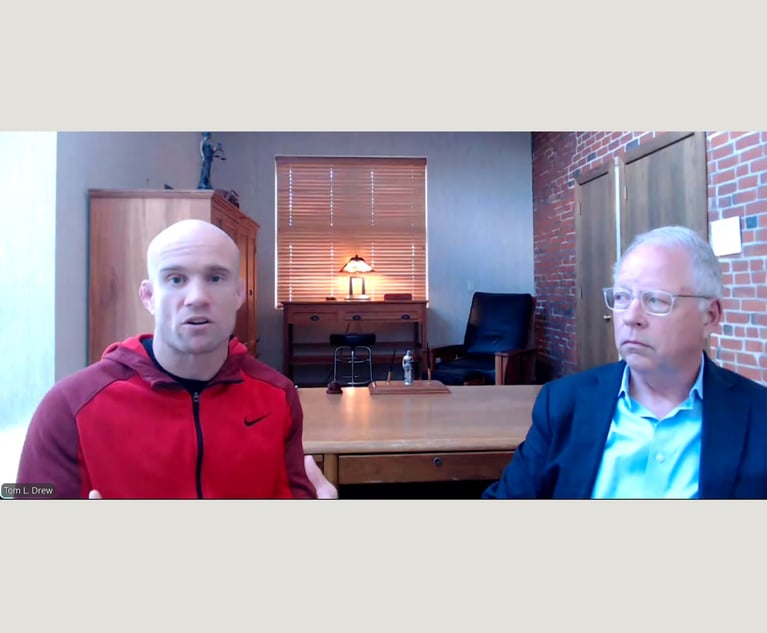 Jack Welch. Photographer: Peter Foley/Bloomberg
Jack Welch. Photographer: Peter Foley/BloombergGE's Jack Welch and the Inside Counsel Revolution
Jack Welch, GE's legendary CEO, died last weekend. Lengthy obits about his business career followed. But few know of the vital role Jack played in the inside counsel revolution.
March 05, 2020 at 02:02 PM
6 minute read
The original version of this story was published on Corporate Counsel
Jack Welch, GE's legendary CEO, died last weekend. Lengthy obits about his business career followed. But few know of the vital role Jack played in the inside counsel revolution.
Ironically, Welch had no idea of that role when he, almost accidentally, hired me in May 1987. I met him at GE's then-headquarters on Lexington Avenue in New York, having never laid eyes on him before or done even one hour of work for GE as a DC appellate lawyer. After a 30-minute interview, he offered me the GE GC job. "But …" I sputtered, "I am not a corporate lawyer!" He laughed: "You'll figure it out. I'm not sure what I want—all I know is that we need to turn the law department upside down."
Jack then took three fundamental steps that transformed GE Legal and helped transform the legal profession.
First, he gave me total support as I replaced 30 of 33 direct reports in the first few years I was at GE. He was a huge believer in top talent, and wanted to evaluate all the new people I was bringing in to be head of corporate functions (tax, litigation, environment, M&A, etc.) or to be general counsel of our huge divisions (Power, Engines, Medical, Capital, NBC, etc.). He personally interviewed each one—often for 45 minutes to an hour. He personally approved pay packages I suggested (in conjunction with the head of HR) to woo lawyers away from top positions in firms or government—packages that were sometimes higher than the compensation for heads of business for whom they would work. He personally became friends with many of them—and would call them directly. And he promoted them to bigger legal jobs or to key business jobs in the company (e.g., head of GE Japan, head of Strategic Planning, head of GE's huge aircraft leasing business).
The inside counsel revolution at GE was led by this incredible partnership of top lawyers—by the great cadre of inside specialists and generalists that got the attention of the profession—but it was Jack who personally hired the partnership.
Second, Jack deeply believed in the two foundational elements of the revolution. The general counsel and other top inside lawyers became core members of top management, present at all key meetings and fully engaged in vital debates about the future direction of the company: not just about defense, but also about offense; not just about law, but also about business; not just about risks, but also about opportunities; not just about decisions but also about execution; not just about public policy but also about geopolitics. He strongly encouraged the lawyers to take "stretch assignments" so they could grow (I was given responsibility for public affairs, taxes, trade, environment, security, and crisis management). And he treated the GC as a peer of the CFO. All these inside developments combined dramatically to increase the expertise, quality, breadth, and compensation of the top inside lawyers.
But Jack also strongly supported the second main element of the inside counsel revolution: the shift of power from outside law firms to inside law firms over both matters and money. Jack was a huge believer in expertise and speed. When he started to work with a few of the early recruits to GE Legal (like John Samuels in tax or Pam Daley in M&A), he realized that having super-lawyers inside the company was an enormous add to smart, fast decision-making that saw risks but found lawful and creative ways around those problems. That is why he was willing to pay top dollar to bring talent inside—and he also understood that, however expensive, inside talent was cost effective on the kinds of hard problems faced by a cutting-edge global company.
Third, Jack empowered GE Legal to work with GE Finance and the GE businesses truly to create a culture of performance with integrity—with deep respect for law, ethics, and values. He knew that GE was an iconic global company at a time of increasing controversy about globalization and that it would be the target of critics if it made major mistakes. Jack grew famous, of course, for the financial success of GE, but he also wanted to be the CEO of vast company that had a strong culture and tried to reduce wrong-doing to the irreducible minimum (we weren't going to repeal human nature). Emblematic of this commitment were words he used at virtually every meeting of senior managers:
- The corporation is built on its reputation and trust—performance with integrity is the foundation.
- Each senior leader will be held personally accountable.
- No cutting of corners for commercial reasons—integrity must never be compromised to make the numbers
- One strike and you're out. You can miss the numbers and survive. You cannot miss on integrity.
In significant signaling to top GE leadership, he had no hesitation about terminating top leaders who had committed first order sins of commission (hiring third-party distributors in China who got orders through bribes), or omission (a top officer who failed to create a culture of integrity in a scandal that lasted too long and involved too many). And when GE employees had clearly conspired with Israeli Air Force officers to misappropriate U.S. governmental funds in the early 90′s, he ordered strict discipline, systemic remediation, and complete cooperation with the SEC, DOJ and a tough House investigative subcommittee. His actions as a CEO set the standard for how companies deal with wrong-doing.
But Jack also took numerous affirmative actions to advance the company's integrity—like being a thought leader in setting labor standards in the supply chain. And, under Steve Ramsey, he created a world-class environmental health and safety organization to handle both legacy environmental issues and to drive worker safety in facilities all across the globe. Obviously, a sprawling company like GE had controversies and critics which (like debates about remediating the Hudson River) are beyond the scope of this remembrance. But GE Legal—and the company—knew that performance with integrity was at the core of Jack Welch's leadership.
There are many causes of the inside counsel revolution, but GE Legal was surely one. And, the GE example was based on the vision and support of Jack. Without him, it would never have happened. He was an awesome leader—with incredible intelligence, energy, vision, operational skills, and charisma. I am grateful beyond measure to have learned so much from a person who was one of a kind.
Ben W. Heineman Jr. was GE's Senior Vice President-General Counsel for two-thirds of Jack Welch's tenure as GE's CEO (1987-2001). He is currently a senior fellow at Harvard's schools of law and government.
|This content has been archived. It is available through our partners, LexisNexis® and Bloomberg Law.
To view this content, please continue to their sites.
Not a Lexis Subscriber?
Subscribe Now
Not a Bloomberg Law Subscriber?
Subscribe Now
NOT FOR REPRINT
© 2024 ALM Global, LLC, All Rights Reserved. Request academic re-use from www.copyright.com. All other uses, submit a request to [email protected]. For more information visit Asset & Logo Licensing.
You Might Like
View All

Helping Lawyers Move Away from ‘Grinding’ and Toward a ‘Flow’

Why Litigation Demand Might Break Firms’ Boom-and-Bust Cycle
Trending Stories
- 1Environmental Fines: Texas Secures Over $100M From Petrochemical Processor TPC Group
- 2US Law Firm Leasing Up Nearly 30% Through Q3, With a Growing Number of Firms Staying in Place
- 3SEC Targets Rising Crypto Financier in $115 Million Securities Fraud
- 4Musk Avoids Sanctions for Skipping SEC Testimony for Rocket Launch
- 5On Advice of DOJ Office, Special Counsel Moves to End Trump Prosecution
Who Got The Work
Michael G. Bongiorno, Andrew Scott Dulberg and Elizabeth E. Driscoll from Wilmer Cutler Pickering Hale and Dorr have stepped in to represent Symbotic Inc., an A.I.-enabled technology platform that focuses on increasing supply chain efficiency, and other defendants in a pending shareholder derivative lawsuit. The case, filed Oct. 2 in Massachusetts District Court by the Brown Law Firm on behalf of Stephen Austen, accuses certain officers and directors of misleading investors in regard to Symbotic's potential for margin growth by failing to disclose that the company was not equipped to timely deploy its systems or manage expenses through project delays. The case, assigned to U.S. District Judge Nathaniel M. Gorton, is 1:24-cv-12522, Austen v. Cohen et al.
Who Got The Work
Edmund Polubinski and Marie Killmond of Davis Polk & Wardwell have entered appearances for data platform software development company MongoDB and other defendants in a pending shareholder derivative lawsuit. The action, filed Oct. 7 in New York Southern District Court by the Brown Law Firm, accuses the company's directors and/or officers of falsely expressing confidence in the company’s restructuring of its sales incentive plan and downplaying the severity of decreases in its upfront commitments. The case is 1:24-cv-07594, Roy v. Ittycheria et al.
Who Got The Work
Amy O. Bruchs and Kurt F. Ellison of Michael Best & Friedrich have entered appearances for Epic Systems Corp. in a pending employment discrimination lawsuit. The suit was filed Sept. 7 in Wisconsin Western District Court by Levine Eisberner LLC and Siri & Glimstad on behalf of a project manager who claims that he was wrongfully terminated after applying for a religious exemption to the defendant's COVID-19 vaccine mandate. The case, assigned to U.S. Magistrate Judge Anita Marie Boor, is 3:24-cv-00630, Secker, Nathan v. Epic Systems Corporation.
Who Got The Work
David X. Sullivan, Thomas J. Finn and Gregory A. Hall from McCarter & English have entered appearances for Sunrun Installation Services in a pending civil rights lawsuit. The complaint was filed Sept. 4 in Connecticut District Court by attorney Robert M. Berke on behalf of former employee George Edward Steins, who was arrested and charged with employing an unregistered home improvement salesperson. The complaint alleges that had Sunrun informed the Connecticut Department of Consumer Protection that the plaintiff's employment had ended in 2017 and that he no longer held Sunrun's home improvement contractor license, he would not have been hit with charges, which were dismissed in May 2024. The case, assigned to U.S. District Judge Jeffrey A. Meyer, is 3:24-cv-01423, Steins v. Sunrun, Inc. et al.
Who Got The Work
Greenberg Traurig shareholder Joshua L. Raskin has entered an appearance for boohoo.com UK Ltd. in a pending patent infringement lawsuit. The suit, filed Sept. 3 in Texas Eastern District Court by Rozier Hardt McDonough on behalf of Alto Dynamics, asserts five patents related to an online shopping platform. The case, assigned to U.S. District Judge Rodney Gilstrap, is 2:24-cv-00719, Alto Dynamics, LLC v. boohoo.com UK Limited.
Featured Firms
Law Offices of Gary Martin Hays & Associates, P.C.
(470) 294-1674
Law Offices of Mark E. Salomone
(857) 444-6468
Smith & Hassler
(713) 739-1250







